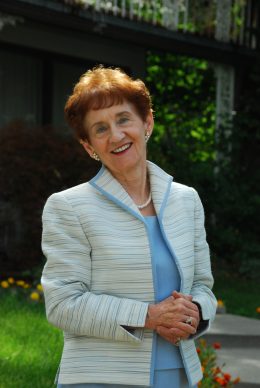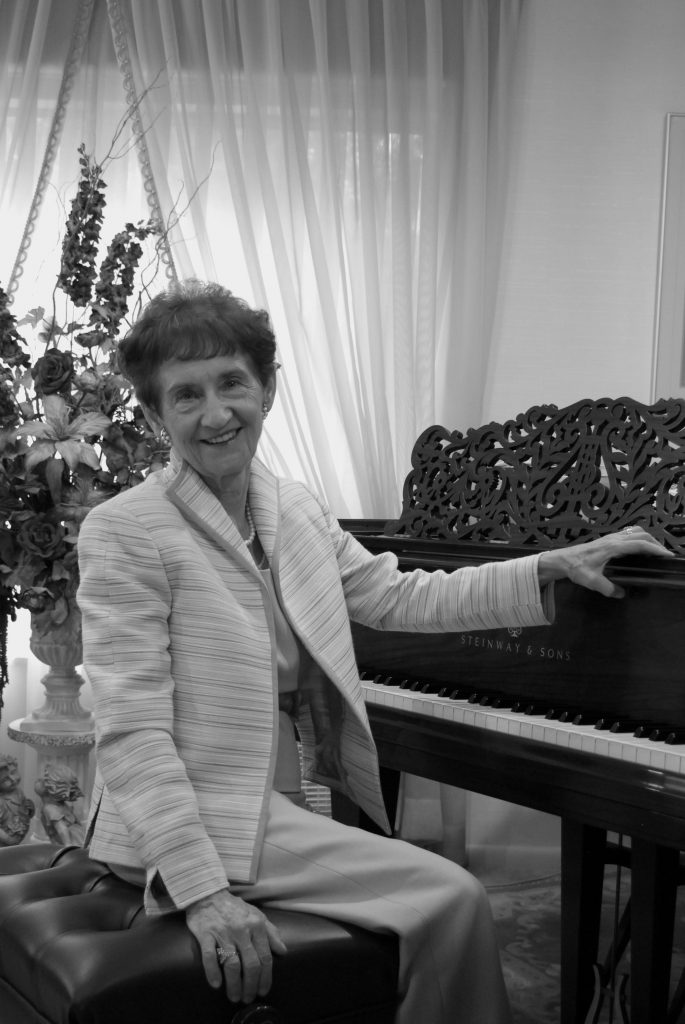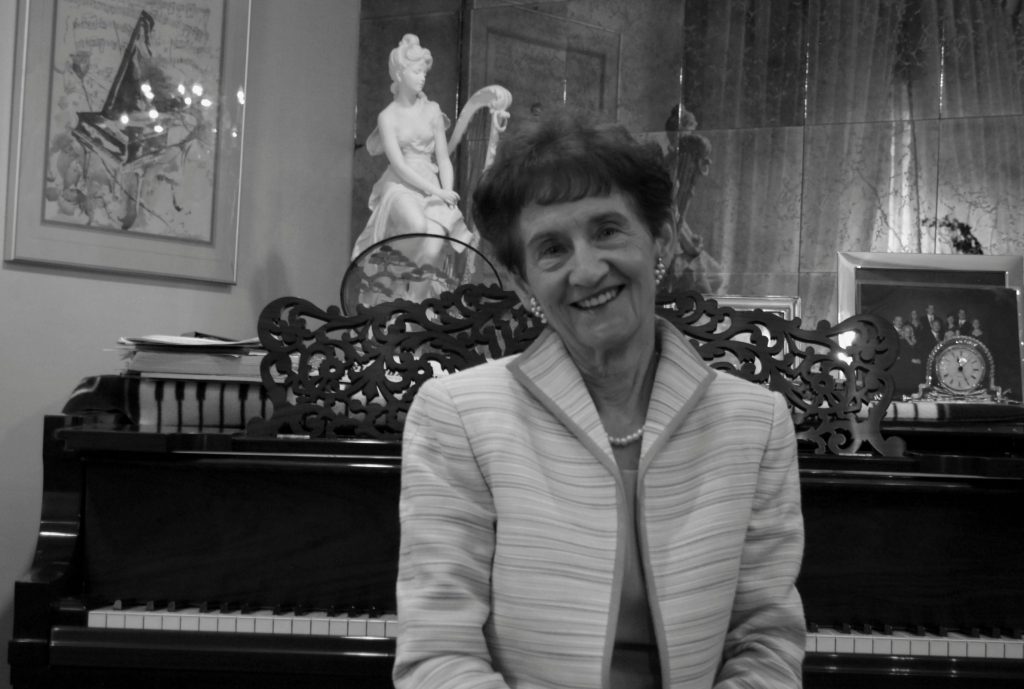Bonnie Winterton had distinguished careers as a conductor and as a professor at the University of Utah, all while raising six children. She feels God guided her musical and personal paths so that she could serve the church as a musician. Although she is eighty-one years old, she continues to teach twenty students, and her goal is to have at least one student when she is one hundred. More important than her accomplishments is her commitment to serving the Lord and to sharing the gift of music with others.
What are some of the moments in your life in which you feel you have been guided and directed?
My favorite scripture is “Trust in the Lord with all thine heart; and lean not unto thine own understanding. In all thy ways acknowledge him, and he will direct thy paths” (Proverbs 3:5-6) I know that my paths have been directed because, as I think back on my life, the things I have done seem impossible to me. And so I know that the Lord has guided me and helped me. I feel that the Lord just took me along for the ride.
I have had two huge careers—as a pianist and as a conductor. I have conducted for the Church in the Tabernacle and in the Assembly Hall and in every venue where you can conduct. I taught private and group piano at the University of Utah for twenty-seven years. For the University, I also conducted three different groups—Women’s Chorus, Masterworks Chorus, and University Singers. I have been on three general Church boards, as well as conducting choirs for general conferences, women’s conferences, and youth conferences.
Tell me about your childhood and how you became involved in music.
I was born in the backwoods of Wyoming. You’ve heard of the “wild, wild West.” That’s where I grew up. My father grew up in the Salt Lake valley, out in Granger; I’ve often thought my life would be completely different if I’d grown up in Salt Lake. But he married my mother. They were on a mission together. In those days, they put one man with two women. I have pictures of my mother and her companion and my father. I am sure this was for protection. But my mother fell in love with my father’s prayers. They would pray before they would go out, and she could see that he was a wonderful man.
After they came home, she invited him to Wyoming. He fell in love with Wyoming and with the beauty and the fishing and the hunting, in addition to falling in love with my mother. They married, and then there we were in the backwoods of Wyoming, in Star Valley. There were no piano teachers there. There wasn’t one teacher in the whole valley as I grew up. When I was nine years old, however, this fabulous teacher—Chester Hill—came into the valley and heard about me. He felt I had talent on the piano, so he taught me and really tried to bring out my potential; and he really did. He assigned me this interesting piece by Lizst—“Rigoletto-Paraphrase”—which is a very difficult thing, when I was ten. I played it, which seems impossible, now, to think that I did.
He was going to send me to an Eastern conservatory. He was preparing me for the big time, musically. He wanted to take me with him to live in Southern Utah, where he could give me lessons when he left the valley. I was eleven. As we left for his hometown in Southern Utah, he became desperately ill. He was moaning and groaning. It was terrible. I remember how awful it was to listen to him. When we got to Salt Lake, his family took him to the hospital; then he was operated on (I think it was for gallstones). I then became desperately homesick. They were very kind and good to me but I was a child. After two weeks, they they left me at my grandparents’ home. That was the end of my prospect of going to a conservatory.
I feel absolutely certain that the Lord wanted me to serve the Church instead of having a big career. Several times I had possibilities—great teachers—and I was stopped every time. I am thankful that I was stopped because I have married and have had six wonderful children. If I had been a concert pianist, that would not have happened. As I graduated from BYU, the music department told me they wanted to send me to Julliard to study there for a year or two, and then I would be the main piano teacher at BYU. When I went to BYU, they didn’t have one piano teacher on the faculty. Can you imagine? Impossible. I took piano lessons and organ lessons from the organ teacher. I took piano lessons from the theory teacher, who could play the hymns and that kind of thing, and from the head of fine arts, Gerrit de Jong. My best teacher was the band teacher. He couldn’t play the piano at all, but he was a fine musician. So I took lessons from him, and he helped me musically, with the interpretation of music.
I didn’t have a desire to go to conservatory, though. I wanted a family, and my husband, Boyd, didn’t want to sit and wait for me to go to Julliard. He was twenty-eight and wanted to marry, and so did I. So we married, for which I have been very grateful. I have six children and now have twenty-seven grandchildren and five great-grandchildren. And wonderful careers in both conducting and piano teaching and playing. As much as I love music, I wouldn’t trade any of my children for all the music in the world. I am grateful that the Lord guided my paths. There is no question in my mind that our paths are guided.
How do you serve God through music?
A student gave me a picture that says, “Music is a gift given by God, one that grows when lovingly shared with others.” That’s how I feel about sharing music, and that’s why I’m still teaching. I’m eighty-one. I have twenty students, and I wouldn’t think of stopping. I love it. I love teaching them. Last Sunday I played the organ for church, which is part of my calling; I play the organ once a month.
Sometimes I will also go to the sacrament meeting of one of my students, and recently a student and I played an organ and piano duet. Hopefully we will contribute to the spirit of the sacrament meeting. Music is a gift in our lives. I had one lady say she couldn’t face life without music. So I have felt it is my responsibility to serve in music, in the community, in the church, wherever I am, and among my friends.
What is it specifically about music that lends itself to service?
I feel that it is a gift from God. I am absolutely convinced that when we participate in music we are bringing the Spirit of the Lord into our lives and into the lives of those who listen to our music. Music is a direct pipeline to heaven. As I play the music of these classical composers, and as I teach this music, there is no doubt that they were inspired to write the things that they wrote so we can have the great gift of the Spirit of the Lord when we hear the music. We have some music now that doesn’t reflect the Spirit of the Lord. There is some music and there are some lyrics that go in the opposite direction.
A wonderful scripture says, “For my soul delighteth in the song of the heart; yea, the song of the righteous is a prayer unto me, and it shall be answered with a blessing upon their heads” (Doctrine and Covenants 25:12). I am absolutely sure of that, too. When we participate in music—and it says the song of the righteous, so the songs that we sing in church—are a delight to the Lord. It’s a communication with the Lord, and he is delighted with it and it’s like a prayer. I tell my students that when you play the hymns and the children’s songs it’s like a prayer to the Lord. He’s told us that. And we’ll have blessings come down upon our heads. I tell that to the children and the young people—that blessings will come into our lives because of music that we are dedicating and singing to the Lord.
What are some of the pieces of music that you feel have been most important to you, either for their musical significance or their spiritual significance or both?
I believe that the hymns are one of the greatest gifts that we have. I believe that if you were to start at the first of the hymnbook and read the words to every hymn that the whole plan of salvation could be found there. As a child I learned to play on an old pump organ. I remember sitting there and pumping as hard as I could playing the hymns. I loved the hymns, and so I was blessed right from the start. I would sing while I was playing, I would sing the words, and I knew by the Spirit that they were true. My testimony came through the hymns of the church. I teach all my students Primary songs and the hymnbook. And I tell my students, “This is the most important book we have.” Bach, Beethoven, Brahms, Liszt, you name them all. But the most important, I think, are the hymns because they teach the gospel.
I’ve had lots of experiences playing background music for general board dinners. Sometimes I take the music by wonderful composers and play it. I find that when you play all those songs people sit there and it’s nice background. Then sometimes I say, “I think I’ll surprise them. I think I’ll play the Primary songs.” So I begin to play the Primary songs, and the result is amazing. Up goes the head. They look at me, and they clap. They love the Primary songs. It touches their hearts. So, it isn’t just lovely music. It is the music of the Lord. He’s given it to us.
I love all the classical composers. Some people will say to me, what’s your favorite composer? Impossible. It is whichever one I’m playing at the moment because they were all inspired of the Lord. Right now I’m playing this piece I played when I was ten. It’s by Liszt. Right now Liszt is my favorite because he was inspired. He was a gifted genius when he was a child. He could do anything. He played the Grieg concerto for Grieg—he sight-read it—and Grieg said the only thing he did wrong was he played it too fast. Imagine that. Impossible.
How do you help your students cultivate their gift and love for music?
I feel very strongly that there needs to be a real communication bond between the teacher and the student. Students come to a teacher scared to death. I have to convince them that I love them. Love is a huge part of music. So I have to convince them that I think they’re wonderful and that I think they’re smart. I try to tell my students, “Your hair looks pretty today,” or, “I love your blouse.” I try to find something to compliment them on so they feel that I like them. I find something they’re doing well and say, “You must be smart! You have to be smart to be able to do that.” I try to make my students leave happy and feel like they’re glad they came. I’ve had people tell me that I am blessed that way—that I am able to let the students feel that I love them.
I have had one student who was bipolar. Her teacher didn’t sympathize with that. She screamed at her and said, “What’s wrong with you?” Well, she did have something seriously wrong with her, but she was gifted. After several people couldn’t stand to teach her, the music department sent her to me. And so I went to work on that other part, where I worked with her to let her know that I loved her and that I cared about her. She told me, “I can’t afford to take piano lessons in the summer, so I have to stop.” I was teaching her at the university. I said, “No, I will give you free lessons. All you have to do is practice.”
I have a studio policy that is very firm. But then I give on it, like I did for this girl. The summer went by and she moved forward so that she was able to perform beautifully and graduate. Now she teaches piano. She has a good life. She has a happy life. We need to meet the needs of our students so that they know we care, that we love them, and then they respond to that.

We all suffer and have problems that we have to just learn to live with. We’re supposed to help people with their problems. You can touch people’s hearts through music. By finding music that they love they feel the Spirit of the Lord. And so it helps them in their life.
I don’t hesitate to tell them about faith. I’m very careful not to go too far. Particularly on the university level you have to be careful. One can’t preach to those kids, but one can bring the Spirit of the Lord into their lives. Everybody needs help on this earth. We all need help. I believe in helping students spiritually, too, so I do, every way I can.
Would you share more about teaching as a responsibility to help people?
I feel a real responsibility to help other people feel that music is a gift to make the world more beautiful and a responsibility to teach other people what I know. Especially at my age, I can see why people sometimes stop teaching because we get frustrated with our own world and our own physical problems and our own mental limitations and all those things that happen as we get older. I feel if I could just do a little good that’s a blessing to me, and I have that responsibility to help other people as much as I can. So, I won’t quit. In fact, I have a picture of a man who is one hundred years old, and he has one student. I’ve thought that’s the way I want to be. I want to have one student when I’m one hundred. Life on this earth is a challenge, but if we try to meet the challenge every way we can, then it helps us to contribute and to give other people hope.
I believe that women are desperately in need of something to hold onto and a little piece of this life. That’s what I’ve loved about music—it, my teaching, is this little piece of the world that is mine. Those students walk in my door, gorgeous students, the most beautiful young women and young men, they walk in my studio door and I get to look at them and I see what they wear and I gain insights to the youth of today. They sit down and play beautiful music for me and then they pay me. That doesn’t seem fair. I feel like I should pay them because I get to look at them, I get to feel their spirit, and oh, what a gift that is in my life.
I have prospective missionaries prepare a three-ring binder with all the good music that they can use on their missions. It needs to be a skinny binder filled with music, and I really fight them to get that ready so that when they leave on their mission the music goes with them. I told one student, “Your music will touch people. First you need to give them some music, and then present the gospel. Then their hearts will be ready for it.” Brigham Young said we can’t teach the gospel without good music. I love him for saying that, and I think that’s true. I’ve been telling my student who is leaving for a mission this month, “Have programs. Gather up all the rest of your missionary companions who perform music and give a program, a free program, and invite people. Then after you have performed for them, tell them why you’re here, and their hearts will be ready to hear it.”
Music is one of the greatest gifts that the Lord has given us. Martin Luther said, “Next to the word of God, the noble art of music is the greatest gift that we have on this earth.” I believe that. Music brings the Spirit of the Lord, sometimes better than the spoken word—it really does.
At A Glance
Bonnie Winterton
 Location: Salt Lake City, UT
Location: Salt Lake City, UT
Age: 81
Occupation: Piano teacher, homemaker
Schools Attended: Chaffey Junior College (Ontario, California), Brigham Young University, University of Utah
Languages Spoken at Home: English, German
Favorite Hymn: “Lord, I Would Follow Thee”
Favorite Scripture: 2 Nephi 31:20
Interview by Elizabeth Pinborough. Photos by Elizabeth Pinborough.
At A Glance


